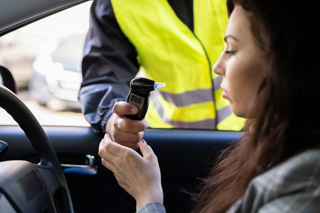The employer of a company car driver involved in a fatal collision while talking on a hands-free phone has avoided prosecution.
Police decided there was no case to answer under health and safety legislation because the call was not work-related.
However, the decision appears to contradict expert opinion on how health and safety legislation should be applied.
Sharmila Mistry, an accounts manager with a pharmaceutical company, was driving to a business meeting at 9.50am on Monday, August 6, 2012.
The 42-year-old was in the middle of a hands-free call in Leicester when she passed through an amber light at 36mph in a 30mph limit area.
Mistry collided with a Mini which sent her vehicle ploughing into pushchairs carrying one-year-old Oliwier Baczyk and two-year-old Zofia Tabaka.
The children were taken to hospital with multiple injuries but both died.
Mistry, from Bushby, Leicestershire, was charged with two counts of causing death by dangerous driving and went on trial at Leicester Crown Court this month.
Last week, a jury found her not guilty of the charges and instead found her guilty of careless driving. She was banned from driving for 18 months and fined £3,000.
During the trial, the court heard that the mother-of-two was initially involved in a collision with the Mini being driven by Christopher Andrews, 61, who has since died of natural causes.
Andrews had driven his Mini through a red light at the busy junction, while Mistry drove through an amber light.
The impact of the crash sent her BMW careering across the road before it mounted the kerb, hit a set of traffic lights and struck the children’s pushchairs.
The court heard Mistry drove 500 miles a week in her job and had one previous conviction for speeding in a 40mph zone, for which she undertook a speed awareness course.
However, the police’s decision not to pursue her employer for a breach of health and safety legislation rested on the nature of Mistry’s call at the time of the incident.
A Leicestershire police spokesman told Fleet News: “The call received by the driver was of a social nature and not work-related, and therefore it did not fall within the Health & Safety at Work Act.
“It was for the driver to ensure their standard of driving did not fall below what would be expected of a competent and careful driver and to follow the advice contained within the Highway Code.”
However, Fleet News has learnt that, while the hands-free call was not work-related, Mistry was talking to a work colleague.
Philip Somarakis, ACFO company secretary and head of the motoring offences team at Davenport Lyons, questioned the police’s reasoning.
He said: “If it was a work-related journey, then her employer does have a duty of care under health and safety legislation, which requires it to ensure, so far as is reasonably practicable, the health and safety of the driver and others whom she may come into contact with.
“A responsible employer will have a mobile phone policy which should remind drivers that, when driving, if they are required to make or receive a hands-free call they should do so only when it is safe.
“It is the driver who should be assessing that risk. Where an employer is aware, for example, that an employee is constantly on the phone when driving, that may shift the emphasis more towards the employer to ensure that the driver is aware of and is actively assessing the risk; indeed, the employer may have to be more active in helping the driver to manage it.”
The Health and Safety at Work Act 1974 requires employers to take appropriate steps to ensure the health and safety of their employees and others who may be affected by their activities when at work.
This includes the time when they are driving or riding at work, whether this is in a company or hired vehicle, or in the employee’s own vehicle.
The Health and Safety Executive (HSE) says that, while employers cannot exercise the same control over hazards to employees when they are on the road as in the workplace, there are practical steps they should take to reduce the risks (see panel, below).
The Corporate Manslaughter and Corporate Homicide Act 2007, which came into force in April 2008, clarifies the criminal liabilities of companies including large organisations where serious failures in the management of health and safety result in a fatality.
The Mistry case compares starkly with another incident involving an at-work driver that resulted in a fatality.
A Preston-based building firm was fined £130,000 over the death of a worker outside a cinema in Ashton-on-Ribble.
The HSE prosecuted EMC Contracts after Carl Green was struck by a reversing van in a paved area outside the entrance to the Odeon Cinema on July 27, 2010.
The 45-year-old painter from Chorley had been working on a project to fit out a new coffee shop in the cinema when the incident happened. He died from his injuries on the way to hospital
During an eight-day trial, Preston Crown Court heard how one of EMC’s employees had unloaded his van of construction materials and was reversing it to park up outside the cinema when it struck Green, who was crossing behind it.
A HSE investigation found the company did not have any control measures in place to keep vehicles involved in the construction work away from pedestrians outside the cinema.
As a result, both workers and members of the public had been put in danger.
EMC Contracts, which has been put into voluntary liquidation, was found guilty of two breaches of the Health and Safety at Work Act, fined £130,000 and ordered to pay £52,790 in prosecution costs on March 5, 2014.
Don’t fall foul of the law – your fleet checklist
Drivers should be:
- competent and capable of doing their work in a way that is safe for them and others
- properly trained
- sufficiently fit and healthy to drive safely and not put themselves and others at risk
- provided with information that will help them reduce risk, such as recommended tyre pressures
- provided with appropriate advice on driving posture
Vehicles should be:
- fit for the purpose for which they are used
- well maintained
Journey planning should:
- take account of appropriate routes
- incorporate realistic work schedules
- not put drivers at risk from fatigue























Bob the Engineer - 24/03/2014 13:11
This case is not exactly the best test case though is it. Anyone can legally drive through on an Amber if its not safe to stop and anyone can be hit by another driver illegally jumping a Red light - whether your on the phone or not. I can't see under what justification the prosecution had for any interest in phone use. Not being on the phone may enable us to be more aware, but there are plenty of dopey drivers not on the phone that would still not spot an errant other driver. How would you prosecute them as well? (Reversing a truck over someone without either a means of visibility or assistance clearly is negligent)